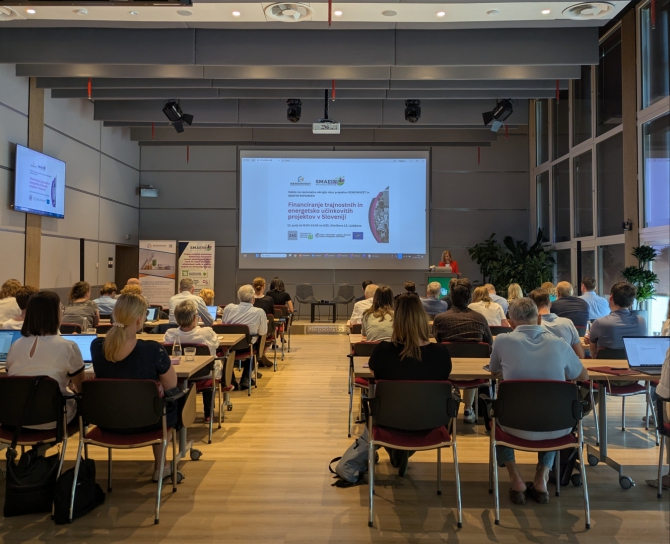
Financing sustainable and energy-efficient projects: Slovenia needs simplification, strategic direction, and support for SMEs
Ljubljana, June 12, 2025 – A national round table was held today at the Chamber of Commerce and Industry of Slovenia, opening a key debate on the financing of sustainable and energy-efficient investments in the private and public sectors. The event was organized by the Slovenian Construction Institute (ZAG), the Chamber of Construction and Building Materials Industry (ZGIGM) and the Jožef Stefan Institute, Center for Energy Efficiency and Sustainability (CENES), within the framework of the European projects RENOINVEST and SMAFIN EXPANDED, with the support of the Ministry of the Environment, Climate and Energy and the LIFE IP CARE4CLIMATE project.
The construction and energy sectors must make a decision, and the state must support them – a turning point?
Slovenia is facing a major challenge: how to ensure effective and accessible financing for the green transition, with the construction sector playing a key role. At the event, which brought together over 80 participants from industry, research institutions, ministries, municipalities, investment funds, and non-governmental organizations, expectations were clearly articulated, especially the obstacles that are still hindering the acceleration of investments.
In the introductory part of the event, Jernej Salecl from the Ministry of Economic Development and Technology, Marjana Majerič from the Chamber of Commerce and Industry of Slovenia, and State Secretary Uroš Vajgl from the Ministry of the Environment, Climate, and Energy emphasized that Slovenia needs a connected ecosystem for the development and implementation of sustainable projects. They agreed that the state must take on the role of promoter and connector—not only through legislation, but also through operational and technical support.
The potential for funding exists – the challenge remains implementation
In the central expert panel, experts presented existing sources of funding and instruments – from the SID Bank Holding Fund to national mechanisms within the framework of the revised NEPN. Dr. Marko Kirn (SID Bank) explained that in recent years, Slovenia has had access to European funds that should have been passed on to beneficiaries as favorable loans through the Fund of Funds. However, these resources have not been fully utilized due to narrowly defined target groups, restrictive eligible costs, and overlapping with non-repayable state aid.
Mag. Stane Merše (IJS CEU) highlighted that achieving NEPN targets by 2030 will require at least €18 billion and systematic coordination of funds, projects, and capacities.
Mag. Erik Potočar (MOPE) presented the new Energy Efficiency Act (ZURE), introducing renovation roadmaps, measures against energy poverty, and approaches to renovating cultural heritage. The discussion revealed that while funding is available, conditions are often too complex, calls for proposals lack clarity, and communication between institutions and investors remains insufficient.
Circular construction remains an untapped opportunity
The first round table on circular construction, led by Dr. Sabina Jordan (ZAG), revealed that legislative barriers to using secondary raw materials and bio-based products remain significant. Antonija Božič Cerar (CCIS) emphasized that current waste classification and treatment practices fail to reflect the real potential for reuse. Katja Bučan (GZS) pointed out that public procurement still does not systematically include environmental criteria.
Dr. Alenka Mauko Pranjič (ZAG) highlighted the difficulties faced by manufacturers, including complex procedures for environmental product declarations (EPDs), ambiguous product classifications, and a lack of testing capacities.
Financial instruments require greater flexibility
The second round table, led by Dr. Gašper Stegnar and Tomaž Fatur (IJS CEU), focused on designing combined financial models. Tadeja Kovačič (Eko sklad) shared pilot cases where subsidies and favorable loans were successfully combined. However, the discussion showed the need for more funds, new transparent instruments for SMEs, and tailored solutions for apartment owners. Proposals included launching pilot projects for comprehensive multi-apartment renovations, promoting good practices, creating one-stop shops, and financing technical documentation “in stock.”
Ljubo Germič (Slovenian Energy Chamber) added that district heating requires stronger incentives, with the state acting as an anchor investor to trigger private capital.
Necessary measures – what do experts propose?
Clear recommendations were formulated:
-
Establishment of a single point of contact for investors in energy efficiency, offering advice, project preparation, and application support.
-
Simplification of tender procedures and better advance notification of available funds.
-
Introduction of guarantee mechanisms and revolving funds for private investors.
-
Promotion of sustainable construction products through targeted public procurement.
-
A stronger role for the state as an “anchor investor,” especially in large-scale system renovations.
Conclusion
The event showed that Slovenia has a clear expert consensus on what needs to be done – but operational implementation must follow. Linking projects such as RENOINVEST and SMAFIN EXPANDED allows solutions to be tested in practice and provides valuable feedback for policymakers.
Participants agreed that the key challenges are not awareness or lack of strategies, but slow system responsiveness, fragmented responsibilities, and limited understanding of on-the-ground realities. Faster action, systemic solutions, and stable conditions are needed to support complex industrial projects and create a competitive, sustainable construction ecosystem.
In the concluding remarks, it was emphasized that Slovenia must urgently move from strategic declarations to real implementation, removing administrative and legal barriers that hinder the use of available EU funds. Every month of delay means lost investment momentum, business opportunities, and development capital.
Slovenia has both the opportunity and responsibility to shift from stagnation to smart acceleration. Using knowledge, cooperation, and courage, the country can overcome obstacles and advance toward a sustainable, circular, and competitive future.
GZS ZGIGM, together with ZAG, IJS, and their partners, will work to translate the insights of this round table into concrete measures, particularly through stakeholder integration and the activities of the Slovenian Center for Circular Economy (SCKG).
The presentations from the event are available via the following link, or you can download them below.
1. Holding Fund and Financial Instrument for Financing Sustainable and Energy-Efficient Projects in Slovenia by Marko Kirn
